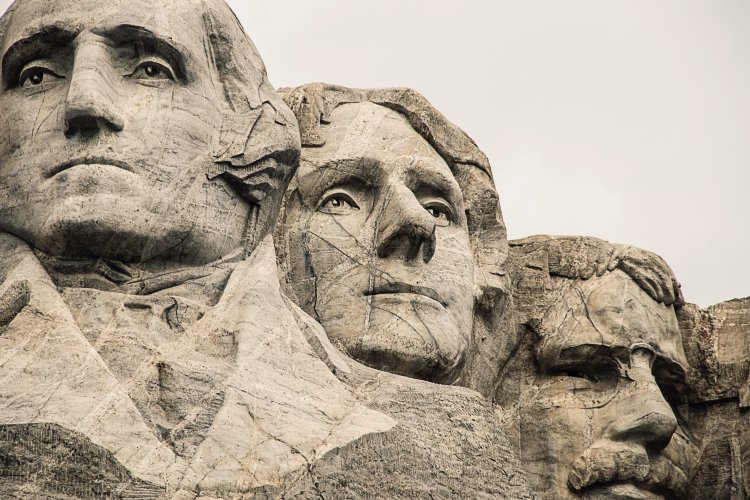The Founding of the United States: A Historical Perspective on the Birth of a Constitutional Republic

The United States was founded as a constitutional republic, not a pure democracy, and this distinction is an important aspect of the country's political structure. Here's an explanation of this concept:
-
Republic vs. Democracy: In a pure or direct democracy, citizens participate directly in decision-making, voting on laws and policies themselves. In contrast, a republic is a form of government where representatives are elected by the people to make decisions on their behalf. The United States was deliberately structured as a republic because the Founding Fathers were concerned about the potential dangers of direct democracy.
-
Founders' Concerns: The framers of the U.S. Constitution, such as James Madison, were deeply concerned about the "tyranny of the majority." They worried that in a pure democracy, the majority could potentially infringe on the rights of minorities, and that public opinion could be easily manipulated. To safeguard individual rights and liberties, they designed a system of government where representatives would be elected to make decisions, with checks and balances to limit the power of any single branch or faction.
-
Constitutional Framework: The U.S. Constitution, ratified in 1787, established the framework for this constitutional republic. It created a system of government with three branches: the legislative branch (Congress), the executive branch (the presidency), and the judicial branch (the federal courts). The Constitution delineates the powers and limitations of each branch, ensuring a separation of powers to prevent any one branch from becoming too powerful.
-
Bill of Rights: A critical component of the U.S. constitutional republic is the Bill of Rights, the first ten amendments to the Constitution. These amendments protect fundamental individual rights and liberties, even in the face of majority rule. They include freedoms of speech, religion, the press, the right to bear arms, and protection against unreasonable searches and seizures, among others.
-
Election of Representatives: In the United States, citizens elect representatives to make decisions at various levels of government, from local and state to federal. These representatives, in turn, make laws and policies on behalf of their constituents, with respect for the Constitution and its limitations.
-
Checks and Balances: The concept of checks and balances further reinforces the republic's nature. It ensures that no single branch of government becomes too powerful and allows each branch to monitor and limit the actions of the others. For example, the President can veto legislation passed by Congress, but Congress can override the veto with a supermajority vote.
- Introduction: Tracing the Birth of a Constitutional Republic
This blog post provides detailed information on the founding of the United States, offering a
historical perspective on the birth of the Constitutional Republic. Understanding the events
and ideas that shaped the nation is essential for anyone interested in American history and
politics. By examining the key figures, documents, and debates of the time, we can gain a
deeper appreciation for the principles and values that continue to influence our country
today. Whether you are a history enthusiast or simply curious about the origins of the United
States, this blog post offers a comprehensive exploration of this pivotal period in American
history. - The Foundations of the United States: From Colonial Era to Revolutionary War
The founding of the United States was a journey that began long before the Revolutionary
War. To truly appreciate the birth of the Constitutional Republic, one must first understand
the foundations upon which it was built.
The colonial era laid the groundwork for the ideals and aspirations of the American people.
The early settlers brought with them a desire for religious freedom, economic opportunities,
and self-governance. However, tensions grew as the British imposed various taxes and
regulations on the colonies, leading to a growing sense of discontent and resistance.
The Revolutionary War, fought between the American colonies and Great Britain, was a
turning point in American history. This bloody conflict solidified the commitment to
independence and set the stage for the formation of a new nation. The Declaration of
Independence, penned by Thomas Jefferson, boldly proclaimed the ideals of liberty and
equality that would shape the future of the United States.
In the next section, we will delve deeper into the colonial era and the Revolutionary War,
examining the key events and influential figures that contributed to the birth of the
Constitutional Republic. Stay tuned to gain a more comprehensive understanding of this
transformative period in American history.
3. Struggles and Ideals: The Path Towards Independence
In this section, we will explore the struggles and ideals that paved the way for American
independence and shaped the birth of the Constitutional Republic. The colonists faced
numerous challenges and hardships as they sought to assert their rights and break free from
British rule.
One significant factor was the implementation of various British laws and taxes that burdened
the colonies. The Stamp Act, passed in 1765, imposed a tax on printed materials and sparked
widespread protests. This was followed by the Townshend Acts, which levied duties on
imports such as glass, lead, and tea, leading to boycotts and heightened tensions.
The Boston Massacre of 1770 further intensified the growing divide between the colonists and
the British. This tragic event, where British soldiers fired upon a crowd of colonists, resulted in
the deaths of several American civilians, fueling public outrage and anti-British sentiment.
The colonists' struggle for self-governance and representation led to the creation of the First
Continental Congress in 1774. This assembly brought together delegates from the colonies to
devise a unified response to British oppression. It marked a crucial step towards unity and
cooperation among the American people.
As tensions escalated, the Revolutionary War broke out in 1775. The battles of Lexington and
Concord marked the beginning of armed conflict between the colonists and the British army.
The colonists fought bravely for their freedom and independence, relying on the leadership
and determination of figures such as George Washington and Thomas Paine.
It was during this time that Thomas Jefferson crafted the Declaration of Independence in 1776.
This monumental document boldly declared the colonies' right to self-governance and
outlined the inalienable rights of all individuals. It became a rallying cry for the American
people and a testament to their unwavering commitment to liberty.
In the following section, we will examine the significant events and decisions that led to the
eventual victory of the American colonies and the establishment of a new nation. Join us as we
continue our journey into the birth of the Constitutional Republic and discover the
remarkable individuals who shaped its destiny.
4. Crafting the Blueprint: The Constitutional Convention of 1787
After the American colonies achieved victory in the Revolutionary War, they faced the
challenge of creating a stable and effective government. The Articles of Confederation, which
served as the nation's first constitution, proved to be inadequate in maintaining order and
promoting unity. It became evident that a more robust and cohesive framework was essential.
To address this issue, delegates from twelve of the thirteen states gathered in Philadelphia for
the Constitutional Convention of 1787. This historic event aimed to revise the Articles of
Confederation and create a new system of government.
Led by notable figures like James Madison and Alexander Hamilton, the convention resulted in
the creation of the United States Constitution. The framers sought to establish a balance of
power among three branches of government, with checks and balances to prevent any one
entity from becoming too powerful.
The Constitution carefully delineated the authority and responsibilities of the federal
government, as well as the rights and liberties of its citizens. It emphasized the principles of
popular sovereignty and limited government, reflecting the desire to prevent tyranny and
protect individual freedoms.
Throughout the convention, delegates engaged in rigorous debate and compromise to
ensure the Constitution's acceptance and ratification. The final document was signed on
September 17, 1787, and became the foundation of the American government.
In the next section, we will delve deeper into the key features of the United States Constitution
and the enduring impact it has had on the nation's governance and society. Join us as we
explore the remarkable legacy born out of the Constitutional Convention and its lasting
contributions to the birth of a constitutional republic.
5. The Framers' Vision: Principles and Values of the Constitution:
The United States Constitution, crafted by the visionaries of the Constitutional Convention,
embodies a set of principles and values that have defined the nation's governance for over
two centuries. The framers aimed to establish a government that would safeguard individual
liberties, promote justice, and secure the blessings of liberty for future generations.
One of the fundamental principles of the Constitution is the separation of powers, which
ensures a system of checks and balances among the three branches of government. This
division of authority prevents any one branch from becoming too powerful, fostering
accountability and preventing the concentration of power in the hands of a few.
Another key value of the Constitution is the preservation of individual rights and freedoms.
The framers articulated these rights in the Bill of Rights, the first ten amendments to the
Constitution. These essential liberties, such as freedom of speech, religion, and the right to
bear arms, serve as a cornerstone of the American democratic system.
Furthermore, the framers emphasized the principle of federalism, which establishes a balance
of power between the federal government and the states. This system allows for both the
centralization of certain powers necessary for national unity and the delegation of authority
to individual states, maintaining a delicate equilibrium between the two.
As we explore the principles and values embedded within the Constitution in the upcoming
section, we will gain a deeper understanding of how these ideals have shaped the United
States into the constitutional republic it is today. Join us as we delve into the framework that
has guided the nation through times of prosperity and adversity and continues to be a
beacon of democracy around the world.
6. Implementing the Constitution: Challenges and Amendments
While the United States Constitution set out a solid foundation for governance, the
implementation of this framework was not without its challenges. The early years of the newly
formed constitutional republic saw debates and disagreements over the interpretation and
application of the Constitution's provisions.
One of the most contentious issues was the question of federal power versus states' rights.
The balance between the two was constantly tested, leading to debates such as the
Nullification Crisis and the Civil War. These conflicts, while often divisive, ultimately led to a
more robust understanding of federalism and a clearer delineation of powers between the
federal government and the states.
Recognizing the need for flexibility and adaptation, the framers also introduced a mechanism
for amending the Constitution. As societal norms and values evolved, so too did the principles
and requirements needed to uphold a just and equal society. Through the amendment
process, the Constitution has been able to evolve and reflect the changing needs of the
nation.
In subsequent sections, we will explore some of the key amendments that have profoundly
impacted American society, such as the Bill of Rights and the Reconstruction Amendments. By
understanding the challenges faced in implementing the Constitution and the subsequent
amendments, we can gain a deeper appreciation for the ongoing efforts to preserve and
strengthen the principles of our constitutional republic.
7. Legacy and Influence: The Impact of the Founding Fathers' Work
The legacy of the Founding Fathers' work in establishing the United States as a constitutional
republic cannot be overstated. Their vision and dedication to creating a government that
would safeguard individual rights and promote the common good have had a lasting impact
on the nation and the world.
The principles and ideals outlined in the United States Constitution served as a blueprint for
democratic governance and inspired similar movements around the globe. The separation of
powers, the checks and balances system, and the protection of individual liberties became
benchmarks for constitutional democracies worldwide.
Moreover, the Founding Fathers' emphasis on limited government and the rule of law
continues to shape American society today. The enduring legacy of their work can be seen in
the ongoing debates over the interpretation and application of the Constitution, as well as in
the continued efforts to protect and expand civil rights and liberties.
In the following sections, we will delve deeper into the individual contributions of the Founding
Fathers and explore their lasting influence on American politics, law, and culture. Through a
closer examination of their ideas and actions, we can gain a greater appreciation for the
remarkable achievements of the men who laid the foundation for our constitutional republic.
8. Conclusion: Reflecting on the Historical Significance of the United States' Founding
The founding of the United States marks a pivotal moment in world history, as it set a
precedent for the establishment of constitutional republics around the globe. The vision and
dedication of the Founding Fathers in creating a government that protected individual rights
and promoted the common good cannot be overstated. Their principles and ideals, outlined
in the United States Constitution, have become benchmarks for democratic governance.
The ongoing debates over the interpretation and application of the Constitution are a
testament to the enduring legacy of the Founding Fathers. Their emphasis on limited
government and the rule of law continues to shape American society today, evident in the
ongoing efforts to protect and expand civil rights and liberties.
As we delve deeper into the individual contributions of the Founding Fathers, we gain a
greater appreciation for their remarkable achievements. Their work laid the foundation for
the United States as a constitutional republic, leaving a lasting impact on American politics,
law, and culture. Reflecting on this historical significance allows us to understand the
importance of their legacy and the enduring relevance of their ideas in our modern world.
In summary, the United States was founded as a constitutional republic to balance the need for effective governance with the protection of individual rights and the prevention of majority tyranny. While democratic principles, such as free and fair elections, play a significant role in the American system, the structure of government and the emphasis on the rule of law and individual rights make it distinct from a pure democracy.
What's Your Reaction?
















